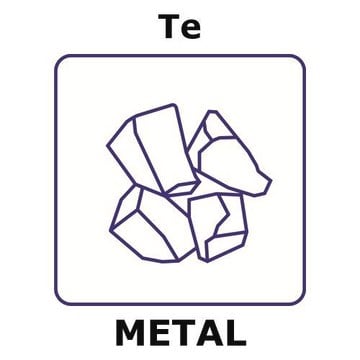All Photos(3)
About This Item
Empirical Formula (Hill Notation):
Te
CAS Number:
Molecular Weight:
127.60
EC Number:
MDL number:
UNSPSC Code:
12141913
eCl@ss:
38040201
PubChem Substance ID:
NACRES:
NA.23
Recommended Products
Quality Level
Assay
99.999% trace metals basis
form
pieces
resistivity
5.8-33 μΩ-cm, 20°C
bp
990 °C (lit.)
mp
450 °C (lit.)
density
6.24 g/mL at 25 °C (lit.)
SMILES string
[Te]
InChI
1S/Te
InChI key
PORWMNRCUJJQNO-UHFFFAOYSA-N
Looking for similar products? Visit Product Comparison Guide
General description
Tellurium is a p-type narrow band gap semiconducting metalloid with excellentphotoconductive and thermoconductive properties. It is widely as a fundamentalconstituent of photovoltaic solar panels, thermoelectronic devices, andalloys.
Application
Tellurium is an essential component for advanced materials including topological insulators such as thermoelectric materials and telluride nanowires. The form of this material is ideally suited for vacuum deposition techniques such as MBE.
Signal Word
Danger
Hazard Statements
Precautionary Statements
Hazard Classifications
Acute Tox. 4 Inhalation - Aquatic Chronic 4 - Lact. - Repr. 1B - Skin Sens. 1B
Storage Class Code
6.1D - Non-combustible acute toxic Cat.3 / toxic hazardous materials or hazardous materials causing chronic effects
WGK
WGK 2
Flash Point(F)
Not applicable
Flash Point(C)
Not applicable
Personal Protective Equipment
dust mask type N95 (US), Eyeshields, Gloves
Choose from one of the most recent versions:
Already Own This Product?
Find documentation for the products that you have recently purchased in the Document Library.
Customers Also Viewed
E C Stangherlin et al.
Toxicology, 207(2), 231-239 (2004-12-15)
The effect of single maternal subcutaneous (s.c.) injection of 0.12 mg/kg diphenyl ditelluride, (PhTe)2, diluted in canola oil at days 6, 10 or 17 of gestation were evaluated in Wistar rats. The reduction of body weight gain was statistically significant
Hridyesh Kumar et al.
Carbohydrate polymers, 97(2), 327-334 (2013-08-06)
The present work describes synthesis of water soluble L-cysteine-functionalized CdTe quantum dots (QDs) with size tunable emission at different time intervals for chitosan based film. The characterization of the synthesized CdTe QDs-chitosan film was made by Fourier transform infrared (FTIR)
Edward R T Tiekink
Dalton transactions (Cambridge, England : 2003), 41(21), 6390-6395 (2012-01-19)
Despite being disparaged for their malodorous and toxic demeanour, compounds of selenium, a bio-essential element, and tellurium, offer possibilities as therapeutic agents. Herein, their potential use as drugs, for example, as anti-viral, anti-microbial, anti-inflammatory agents, etc., will be surveyed along
Katja C Nowack et al.
Nature materials, 12(9), 787-791 (2013-06-19)
The quantum spin Hall (QSH) state is a state of matter characterized by a non-trivial topology of its band structure, and associated conducting edge channels. The QSH state was predicted and experimentally demonstrated to be realized in HgTe quantum wells.
Zhe Liu et al.
Optics express, 21(6), 7799-7810 (2013-04-03)
ZnTe is an important p-type semiconductor with great applications as field-effect transistors and photodetectors. In this paper, individual ZnTe nanowires based field-effect transistors was fabricated, showing evident p-type conductivity with an effect mobility of 11.3 cm(2)/Vs. Single ZnTe nanowire based
Our team of scientists has experience in all areas of research including Life Science, Material Science, Chemical Synthesis, Chromatography, Analytical and many others.
Contact Technical Service









